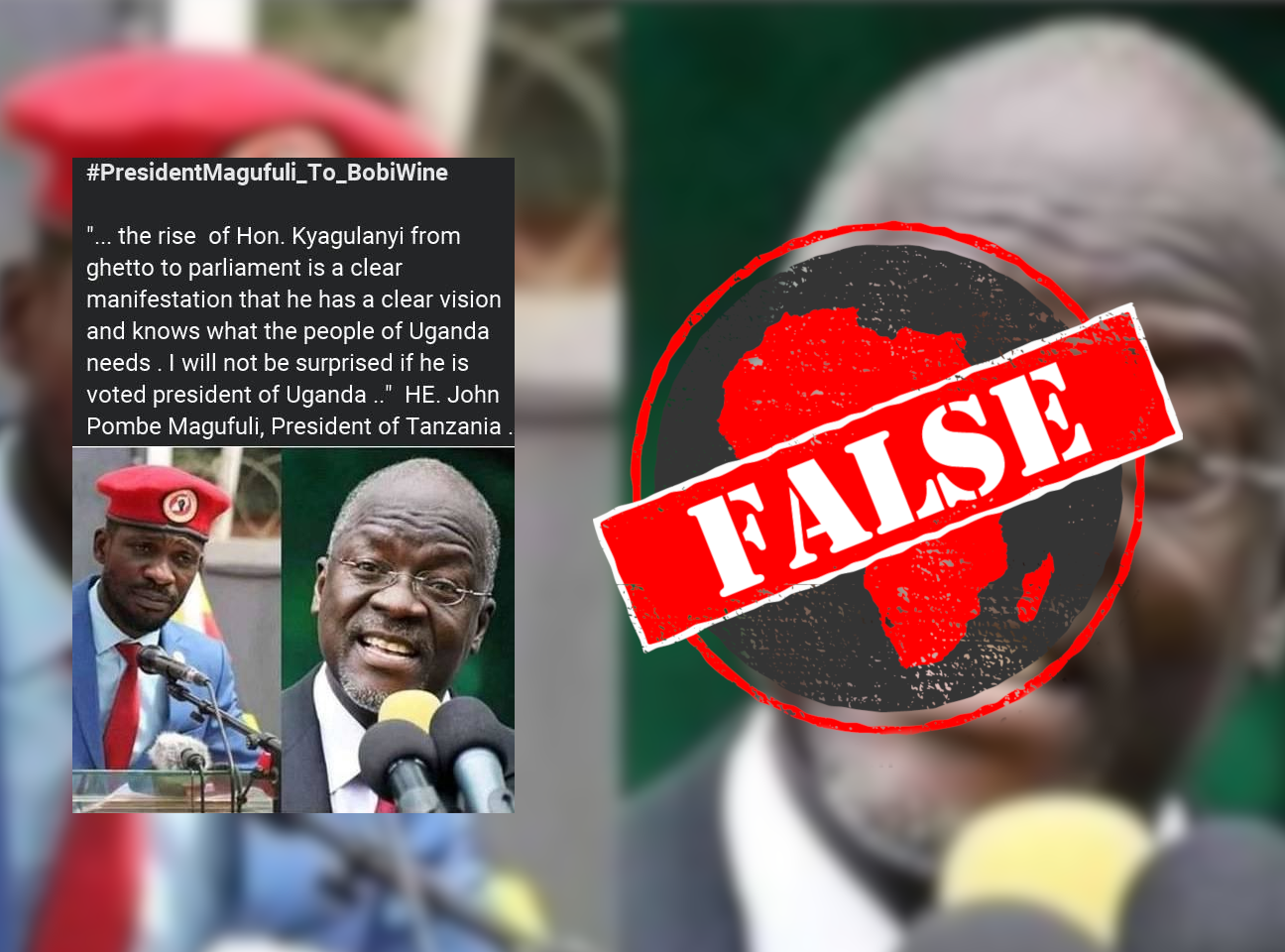A screenshot posted on Facebook in December 2020 attributes a quote to Tanzanian president John Magufuli, in which he seemingly endorses Ugandan opposition leader Robert Kyagulanyi, known as Bobi Wine.
It reads: “The rise of Hon. Kyagulanyi from ghetto to parliament is a clear manifestation that he has a clear vision and knows what the people of Uganda needs. I will not be surprised if he is voted president of Uganda.”
Uganda holds presidential elections on 14 January 2021. Wine is the most prominent candidate among 10 running against president Yoweri Museveni, who has been in power since 1986.
The screenshot, which looks like a tweet, shows photos of Wine and Magufuli. It has been shared more than 200 times on a Facebook group with over 31,000 members.
It was posted with the caption: “#PresidentMagufuli_To_BobiWine " The caption also has a YouTube link that leads to a music video, which has no mention of Magufuli or Kyagulanyi.
Has Magufuli endorsed Wine? We checked.

It is unlikely that the president of Tanzania would endorse a candidate standing against his Ugandan counterpart. Such news would have made headlines in East Africa. But a Google search found no news of the endorsement.
A Twitter search for the quote brought up a tweet posted from Kampala, Uganda’s capital, on 8 December 2020. It was tweeted on the account “#kyagulanyi4president” – clearly a supporter of Wine.
If Magufuli had issued this endorsement, it would have been widely shared on Wine’s verified Twitter account. But an advanced Twitter search reveals nothing. Wine has only mentioned Magufuli once, in a retweet from July 2020.
And, in turn, there is no mention of Wine (or Kyagulanyi) on Magufuli’s Twitter account and Facebook page.
It reads: “The rise of Hon. Kyagulanyi from ghetto to parliament is a clear manifestation that he has a clear vision and knows what the people of Uganda needs. I will not be surprised if he is voted president of Uganda.”
Uganda holds presidential elections on 14 January 2021. Wine is the most prominent candidate among 10 running against president Yoweri Museveni, who has been in power since 1986.
The screenshot, which looks like a tweet, shows photos of Wine and Magufuli. It has been shared more than 200 times on a Facebook group with over 31,000 members.
It was posted with the caption: “#PresidentMagufuli_To_BobiWine " The caption also has a YouTube link that leads to a music video, which has no mention of Magufuli or Kyagulanyi.
Has Magufuli endorsed Wine? We checked.

No mention in news or social media
It is unlikely that the president of Tanzania would endorse a candidate standing against his Ugandan counterpart. Such news would have made headlines in East Africa. But a Google search found no news of the endorsement.
A Twitter search for the quote brought up a tweet posted from Kampala, Uganda’s capital, on 8 December 2020. It was tweeted on the account “#kyagulanyi4president” – clearly a supporter of Wine.
If Magufuli had issued this endorsement, it would have been widely shared on Wine’s verified Twitter account. But an advanced Twitter search reveals nothing. Wine has only mentioned Magufuli once, in a retweet from July 2020.
And, in turn, there is no mention of Wine (or Kyagulanyi) on Magufuli’s Twitter account and Facebook page.
Republish our content for free
For publishers: what to do if your post is rated false
A fact-checker has rated your Facebook or Instagram post as “false”, “altered”, “partly false” or “missing context”. This could have serious consequences. What do you do?
Click on our guide for the steps you should follow.
Publishers guideAfrica Check teams up with Facebook
Africa Check is a partner in Meta's third-party fact-checking programme to help stop the spread of false information on social media.
The content we rate as “false” will be downgraded on Facebook and Instagram. This means fewer people will see it.
You can also help identify false information on Facebook. This guide explains how.


Add new comment